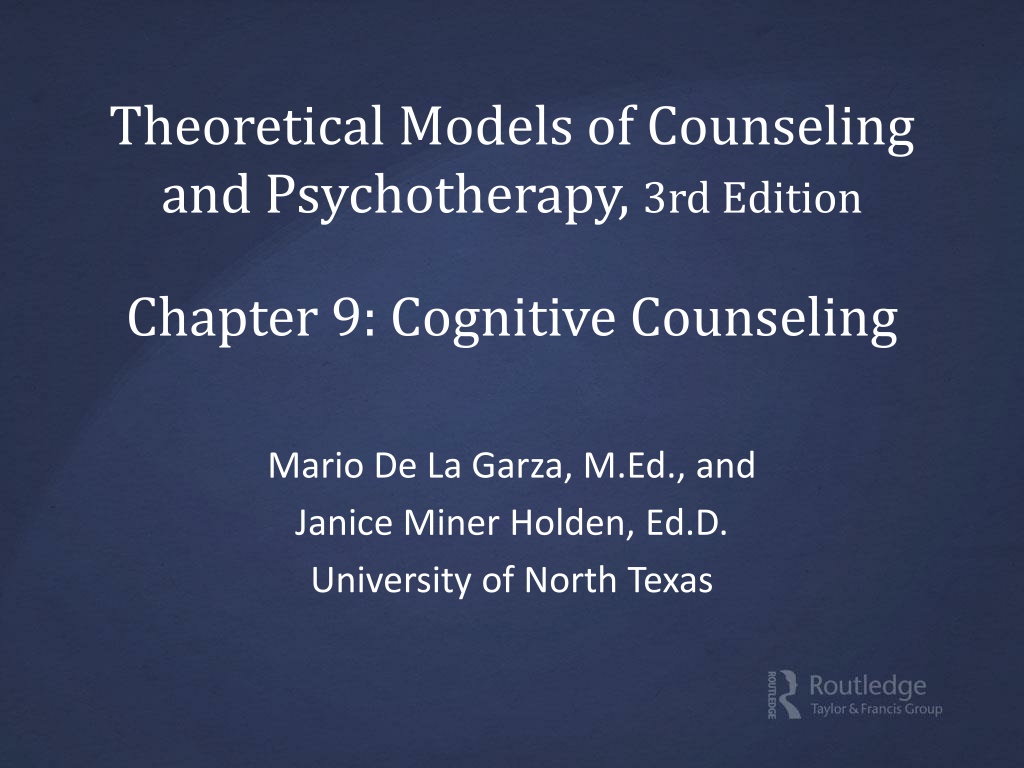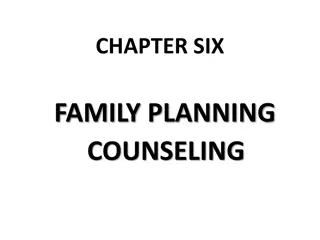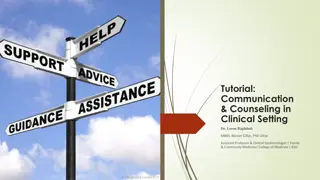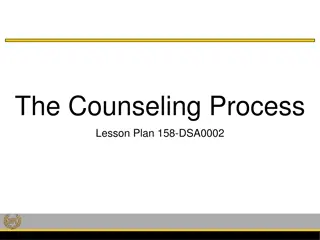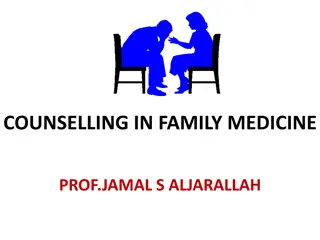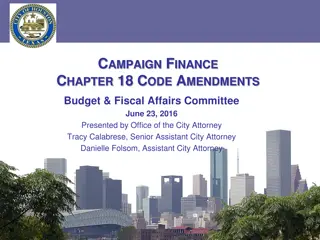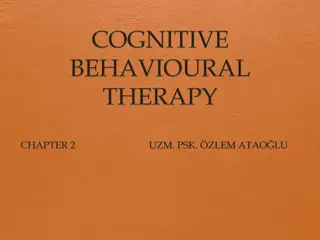Evolution of Cognitive Counseling and Aaron T. Beck's Contribution
In the historical context following World War II, a shift occurred in psychology towards cognitive counseling with the emergence of cognitive therapy by Aaron T. Beck. Beck, a psychoanalytically trained psychiatrist, challenged traditional psychoanalytic concepts and developed cognitive therapy to treat depression, anxiety, and other mental disorders. The philosophical underpinnings of cognitive counseling emphasize the subjective nature of reality, hierarchical structuring of cognition, and the importance of empirical evidence. Understanding the nature of humans in terms of the function of the psyche is central to the cognitive counseling approach.
Download Presentation

Please find below an Image/Link to download the presentation.
The content on the website is provided AS IS for your information and personal use only. It may not be sold, licensed, or shared on other websites without obtaining consent from the author. Download presentation by click this link. If you encounter any issues during the download, it is possible that the publisher has removed the file from their server.
E N D
Presentation Transcript
Theoretical Models of Counseling and Psychotherapy, 3rd Edition Chapter 9: Cognitive Counseling Mario De La Garza, M.Ed., and Janice Miner Holden, Ed.D. University of North Texas
Historical Context Following World War II, people in the United States were optimistic because of economic expansion as well as anxious because of the Cold War. 1950s: conformity and social conservatism 1960s: valuing independence of thought and intellectual integrity In psychology, clinicians found psychoanalysis limited, behaviorism too narrowly focused, and client-centered therapy inefficient.
Aaron T. Beck Suffered from anxieties and phobias that originated with a traumatic childhood surgery and extensive recovery period. Fell behind in school due to illness and concluded he was stupid; devised a plan to catch up, succeeded, and reformulated his belief about his intellect. Learned to be sensitive to others emotions through his relationships with his emotionally erratic mother and an emotionally abusive first grade teacher.
Aaron T. Beck Psychoanalytically trained psychiatrist Wanted to provide research showing efficacy of Freudian method Found that psychoanalytic concepts neither predicted nor explained how depressed patients were functioning Found that depressed patients had formulated a distorted view of reality Went on to create a cognitive therapy treatment for depression, anxiety, and other mental disorders
Philosophical Underpinnings Phenomenology One s reality is subjective and an interpretation; therefore, it is only an approximation of reality. Hierarchical structuring of cognition Kant s concept of schemas Freud s primary and secondary processes Empiricism Evidence leads to a conclusion. If an idea (cognition) is not supported by evidence, it needs to be rejected and replaced. Scientific method
Nature of Humans: Function of the Psyche Humans possess the innate motive of survival. Infants are endowed with the functions of sensation, emotion, memory, and increasing voluntary motor movement. An individual processes information (using the above functions) and determines whether the innate motives are being served. Pleasure usually means yes; pain usually means no.
Nature of Humans: Structure of the Psyche Anxiety Anger Sadness Joy Mode System Cognitive Perceived danger Fear Shaking Sweaty palms Perceived violation Anger Scowling Increased heartbeat Lash out Perceived loss Sadness Crying Tears Perceived gain Happiness Smiling Dilated pupils Emotional Behavioral Physiological Motivational Escape/ Avoid Grieve Seek and approach Schemas
Nature of Humans: Structure of the Psyche Orienting Mode scanning the environment for threats or opportunities related to one s interests Minor Modes activated when one perceives only minor threats to/opportunities related to one s vital interests: working, conversing, driving, etc.; characterized by emotions of minor intensity: scared, mad, sad, glad Major Modes aka primal modes, activated when one perceives major threats/opportunities to vital interests; characterized by intense emotions: anxious, enraged, depressed, manic
Nature of Humans: Structure of the Psyche Conscious control system the system able to de-energize modes through cognition and behavior Minor modes characterized by cognitive flexibility Major modes characterized by cognitive rigidity
Nature of Humans: Structure of the Psyche Levels of cognition: Automatic thoughts Words and images about specific situations Intermediate beliefs (Assumptions) Rules If-then propositions and shoulds Cognitive schemas Core beliefs about self, world, and future Most formed during early childhood when an individual is more likely to make reasoning errors
Role of the Environment Environment: both physical and social Environment is believed to have a greater influence on personality development than one s innate predisposition (genetics). Family environment is highly influential on schema development. Cognitive therapists do acknowledge genetics as influencing how one perceives one s environment.
Healthy Functioning Relative absence of bias in core beliefs Beliefs correspond to evidence Support survival Most of one s time is spent in minor modes Easy accessibility to one s conscious control system. Modal flexibility
Unhealthy Functioning Modal rigidity Most of one s time is spent in major/primal modes with difficulty accessing one s conscious control system. Distorted schemas are exaggerated and persistent. People respond to them with overcompensation or avoidance.
Unhealthy Functioning Cognitive distortions: Aaron Beck Arbitrary inference Selective abstraction Overgeneralization Magnification/minimization David Burns Jumping to conclusions Mental filter Overgeneralization Magnification or minimization Discounting the positives Personalization and blame All-or-nothing thinking Emotional reasoning Should statements Labeling Personalization Dichotomous thinking
Personality Change Process Neutralizing (reducing energetic charge of) dysfunctional modes through use of the conscious control system Motivational and emotional components of a mode are less accessible to direct influence than the cognitive, behavioral, and physiological components. Effective, lasting change occurs through a fundamental shift in the cognitive component of a mode.
Clients Role Distress in one s life is usually the motivator for change. Clients are expected to join the counselor in sharing equal responsibility for client change. Ideal clients can tolerate anxiety of trying different behaviors and are able to recognize the relationships between thoughts, feelings, and behaviors. Clients are emotionally engaged in therapy and provide information about distressing emotions and behaviors as well as improvement.
Clients Role Learn how to convert convictions into hypotheses and apply the scientific method to test their validity. Learn how to modify invalid hypotheses. Complete homework. Give honest feedback about counseling sessions.
Resistance (better known as not changing ) Client may not perceive a problem. Client may not be able to tolerate discomfort of change. Dysfunctional beliefs about therapy (requires no effort; therapist will be controlling) Therapist may have not developed working relationship. Therapist failed to explain reasoning for activity, and/or activity is too difficult. Client and counselor not in agreement on goals of counseling.
Counselors Role To be warm, empathic, and genuine To be an expert in cognitive theory and techniques, having received formal, supervised training To engage the client s conscious control system so that client can avoid or modify problematic mode(s) To teach a client how to identify cognitions and test their validity To be observant, flexible, and able to respond to clients needs To be open to client feedback
Stages and Techniques Relationship establishment and maintenance skills Nonverbal attending Reflecting Open-ended questioning Specific change strategies Socratic questioning Designing behavioral experiments Assigning relevant homework
Techniques Interview as well as various assessments/inventories Socratic dialogue Scaling Cost/benefit analysis Semantic method Double standard technique Reattribution Externalization of voices Downward arrow technique
Interface with Recent Developments in Mental Health Nature/Nurture Incorporates recent developments in genetic research, but still places greater emphasis on environment influencing personality development. DSM 5 Diagnosis Cognitive therapists explicitly reference DSM-IV-TR diagnoses. Pharmacotherapy Affirms the use of psychotropic medications for some conditions
Interface with Recent Developments in Mental Health Managed Care/Brief Therapy Favored because it is inherently a brief, problem-focused approach Technical Eclecticism Any technique consistent with the cognitive theory of emotional disorders can be used. Diversity Issues Takes clients individual perspectives into account Much attention to various diverse populations Effectiveness of Psychotherapy Research has shown efficacy for various disorders
Limitations With the addition of modes and charges, theory became less elegant. Useful thinking rather than positive or even realistic thinking
Contributions Combined humanity and respect of person-centered approach with structure and efficacy of behavioral approach Cognitive profiles Treatment manuals Extensive research
References Fall, K. A., Holden, J. M., & Marquis, A. (2016). Theoretical models of counseling and psychotherapy (3rd ed.).New York: Routledge.
